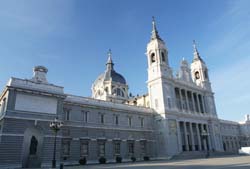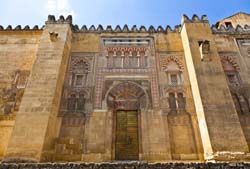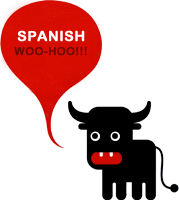Religion in Spain
Spain is known to be a country where perhaps religion plays a bigger part in daily life than in other European cultures and Roman Catholicism has the largest following with approximately 70% of Spaniards admitting their affiliation. The remaining 30% of citizens consider themselves of other religious beliefs or as having no religion.

During the Franco dictatorship, Roman Catholicism was declared as the only official religion of Spain by law and the public display or projection of other religions was prohibited. The teaching of Catholic education was compulsory in schools and practices such as divorce, contraception and abortion were illegalised due to going against strict beliefs based on the Bible; the state was completely intertwined with the Church. During the transition to democracy however, many such prohibitions were lifted, allowing the Spanish population to practice their own religions more freely and steps were put in place in an attempt to separate Church from state. This lead to the now common reference of Religious allegiance in terms of rituals of marriage, celebration and death rather than weekly trips to mass, which few Spaniards rarely continue to take part in, providing evidence for the fact that although the Church still forms a major part of Spanish life, its presence is not necessarily as strong as it once was.
Due to immigration, especially following the repression of the Francoist years, other religions have also become more widespread across Spain; Islam and Judaism also have significant followings as do other branches of the Christian faith such as Protestants and Jehovah’s Witnesses.
Catholicism

It’s hard not to notice the dominance of the Catholic faith in Spain due to the thousands of local Churches and magnificent cathedrals which arose as a result of the strong relationship between the church and state during the regime of Franco. In addition, many of the country’s festivals and national holidays are based on Roman Catholic celebrations with most businesses and schools closing on numerous days of the year as a result.
The pilgrimage to Santiago de Compostela, also known as 'The Way of Saint James', is also recognised worldwide as one of the most religious and popular pilgrimage sites in Spain with many people visiting the endpoint at the Cathedral of Santiago de Compostela every year.
The Sagrada Familia in Barcelona is also a site of particular importance among Spaniards and visitors alike. Designed by Catalan architect Antoni Gaudí, the church was later consecrated by Pope Benedict XVI and has also been awarded UNESCO World Heritage status.
Islam
The first examples of the Islamic faith to exist on the Spanish peninsula arrived during the conquest of southern Spain, later known by Moorish and Arabic name ‘Al-Andalus’, and ruled for around 800 years. It was during this time that the influence of Islam was brought from Moorish areas of North Africa, and evidence of this can still be seen across parts of the region today. Colourful tiling and beautiful mosques are just some of the architectural reminders of a religious past. One of the best and most famous examples of this is the Mezquita in Córdoba; its red and white striped columns are unlike any other building in Spain and are said to resemble rows of palm trees. In 1236 along with the Spanish Inquisition however the mosque was converted into a Cathedral though thankfully much of the original architecture was preserved.

Today there are approximately 1 million Muslims living in Spain and there are around 9 major Mosques in use across the country.
A listing of all Mosques across the country can be found here.
The evolution of religious practice and allegiance has been highly affected throughout Spanish history, from the time of the Spanish Inquisition during which Islam and Christianity came head to head, during the dictatorship of Francisco Franco when Church and State were a superior force over the country followed by the revival of other faiths and free practices from the transition to democracy onwards. Since Francoist Spain, society has changed considerably, especially in terms of religion. Many families moved from rural areas into the city where religious influence was a lot less overwhelming. In addition, younger generations are growing up without the church playing a major part in their lives, much like those in most other European countries at this time, and therefore the actual practice of religion is considerably less common and intense than it was in the past. In contemporary Spain, religion is viewed as a neutral, separate concept that rarely has effect on government and state, although, due to the historical strength of the Catholic Church, its roots are still visible in terms of public holidays and the Spanish monarchy.









